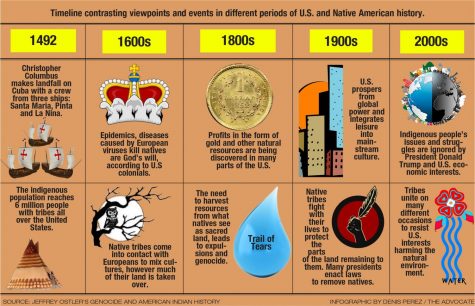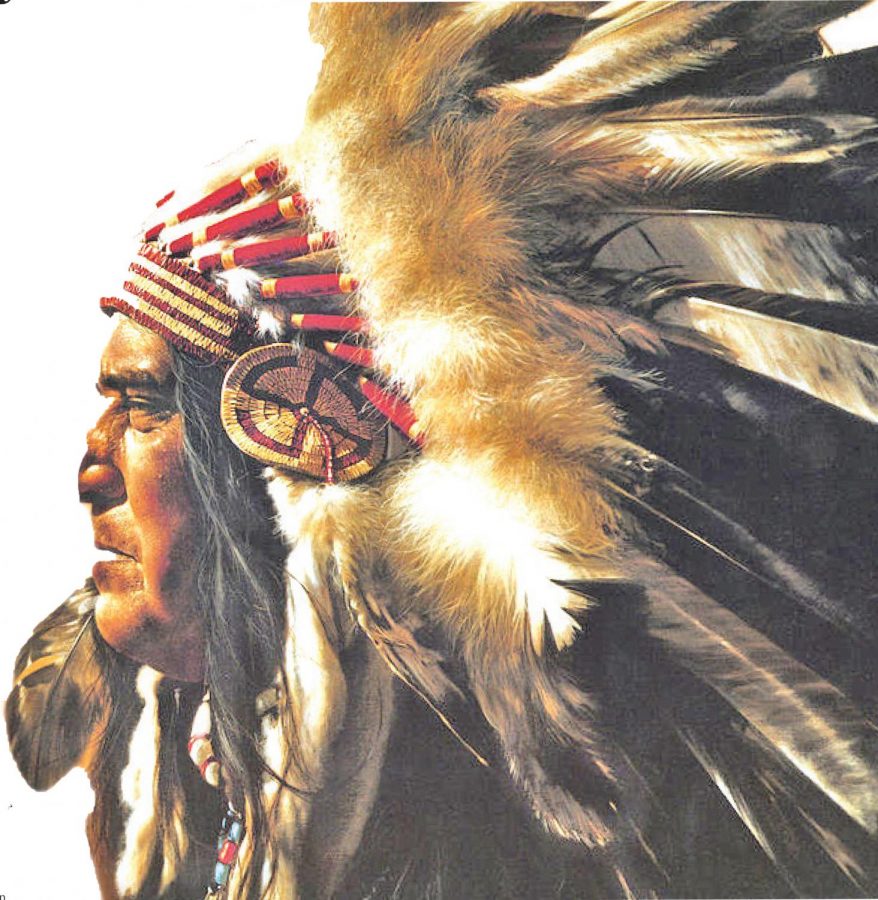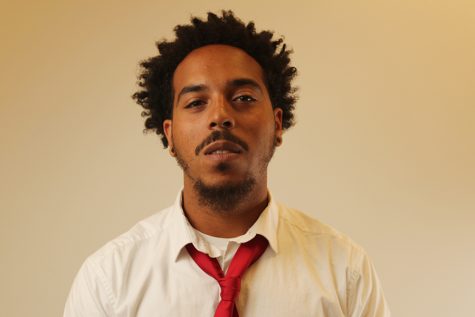Day honors truth, people
Oct 26, 2017
Despite the “white-washing” of traditional American history books, the conveniently forgotten perspective of Columbus as a brutal murderer, rapist and willing participant in the Trans-Atlantic slave trade is slowly becoming a topic of discussion throughout classrooms, libraries and dinner tables across the nation.
Cities and states around the country are swapping out Columbus Day, still a federal holiday, for a holiday signifying a worthier group of people for praise and acknowledgment of their suffering at the hands of European explorers and settlers.
Citizens of all races are welcoming Indigenous Peoples’ Day.
Similar to African-American frustration and hatred for the Confederate flag for what it represents, Native Americans are left with the same vile taste as a celebration for the very man responsible for the murderous genocide of their ancestors is observed every year.
Those who celebrate Columbus Day either do so out of blind patriotism or pure racism because any person with an ounce of knowledge can see that this country was greatly populated generations before the Spanish ships the Nina, the Pinta and the Santa Maria steered toward an “undiscovered” land mass across the Atlantic Ocean.
Although it’s impossible to find an exact number, scholars estimate the indigenous population in the Americas was as high as 112 million people — before European contact in 1492.
Research shows that the population dwindled down to fewer than six million by 1650 due to foreign disease, warfare and the colonization of the continent that European explorers brought to the “New World.”
Columbus introduced the mistreatment of indigenous people to the islands and the influence grew to the continent as European colonization spread across the “new- found” land.
According to the United States Census Bureau, Native Americans now only make up 2 percent of America’s population, with their total population marked at 5.2 million in 2013. America provided the surviving tribes with reservations — land secluded from the general population — in what seems
to be a deterrent from what would be a constant reminder of the murder of the indigenous people of America.
However, pro-Native American right groups and activists are urging legislators around the country to take the step in righting a deadly wrong in America’s barbarous history by abandoning Christopher Columbus Day and establishing Indigenous Peoples’ Day.
The concept of Indigenous Peoples’ Day isn’t new. The idea stemmed from discussions during the 1977 International Conference on Discrimination Against Populations in the Americas hosted by the United Nations in Geneva, Switzerland. South Dakota was the first state to ditch the holiday observing the murderous explorer Christopher Columbus entirely.
In 1989, the state’s Legislature voted unanimously to change Columbus Day to Native American Day as well as make MLK’s birthday a state holiday.
Berkeley was the first city in the country to instate the holiday in replace of Columbus Day in 1992. Along with the re-naming, the city implemented school programs, libraries and museums to promote a better understanding of the indigenous peoples’ struggle since the founding of the Americas by Europeans.
The idea then stretched to Santa Cruz in 1994, making it the second city in the nation to embrace Indigenous Peoples’ Day as an alternative to Columbus Day.
Ten years later various cities such as Seattle, Grand Rapids and Minneapolis decided to follow in the steps of Berkeley and adopt Indigenous Peoples’ Day in 2004.
And the list continues to grow as cities such as Austin, Iowa City, Los Angeles and Portland dropped Columbus Day this year for the holiday recognizing native people.
States such as Alaska, Hawaii and Oregon don’t acknowledge Columbus Day at all, as others like California and Nevada declared the fourth Friday of September Native American Day to make amends for the racial genocide placed upon them by the first European settlers.
Columbus deserves no one’s sympathy for his dethroning from social sainthood and the removal of his holiday.
He was a brutal racist who shared the same repulsive disregard for Native American life as he did African life.
With the establishment of Hispaniola, the first permanent European settlement in the Americas, Columbus began killing, capturing and enslaving the indigenous people of the island. Once the cruelties of forced labor and famine demolished the island population, Columbus ordered an import of African slaves to fill the void. Under Columbus’ rule, slaves who didn’t collect enough gold were punished by getting a hand chopped off. Rebel Spanish colonists who were sympathetic to natives were executed.
Columbus was arrested for his tyrant like rule and lost his governorship, although he was quickly set free and subsidized for his fourth voyage.
Embracing Indigenous Peoples’ Day in replace of Columbus Day is a clear attempt to atone for the enslavement, disease, genocide and forced assimilation that native populations endured for hundreds of years at the hands of colonists. But is it enough? Clearly no, but it’s start.
Native American heritage should be observed for an entire month and their history should be taught in every school around the nation.
The destruction of nearly an entire indigenous population is a shameful stain on America’s history that is in need of washing.




Baracutey • Oct 29, 2017 at 6:22 am
“…states around the country are swapping out Columbus Day… for a holiday signifying a worthier group of people for praise and acknowledgment…”
You enjoy writing propaganda articles to slander a history you know nothing about? Then let’s review history facts about that “worthier group of people” to purport to praise:
Account of Rachel Plummer, June 1836 (Texas)
“In her account of her life among the [Comanche], Rachel wrote that six weeks after giving birth to a healthy son, the warriors decided she was slowed too much by childcare, and threw her son down on the ground. When he stopped moving, they left her to bury him. When she revived him, they returned and tied the infant to a rope, and dragged him through cactuses until the frail, tiny body was literally torn to pieces.”
—————————-
Account given to me by descendant of William Overall, 1793 (Kentucky)
Chief Doublehead [Cherokee]- His most infamous atrocity occurred in 1793 when he murdered Captain William Overall and a companion in Kentucky, stripped the flesh from their bones, roasted it, and ate it. He carried their scalps to Indian towns that were at peace with the whites and aroused the young braves to join his war party.
—————————-
Ranch incident, November 25, 1839 (Florida)
Shortly after the mail wagon left the city Dr. Philip Weedman, Sr., accompanied by his little son, a lad about twelve years of age, both in an open wagon, with Mr. Graves, on horseback, left for the purpose of visiting his former residence… On arriving at the commencement of Long Swamp, without any previous warning, he was fired upon [by a Seminole band] and killed, having received two balls in his breast; his little son was wounded in the head, baring his brain; also cut with a knife. The mutilated youth, with the remains of his dead father, were brought in town today.
—————————-
Theater Troop Attacked May 27, 1840 (Florida)
“We learn from a passenger in steamer General Clinch, Capt. Brooks from Black Creek, that on Saturday forenoon, between 9 and 10 o’clock, Mr. Forbe’s theatrical company, with some others, were on their way from Picolata to St. Augustine, and within five or six miles of the latter place, (the party occupying two wagons,) when the wagon in the rear was attacked by a by Coacoochee [Miccosukee] and his band. Mr. C. Vase [was] killed and mutilated. Two others are dead… part of Mr. Forbe’s company.”
—————————-
If the personage of Columbus deserves no one’s sympathy, much less the ones that you write in favor of.
“Native American heritage should be observed for an entire month…”
IT ALREADY IS!!!- Even with the above accounts stated, every November is “Native American Heritage month” proclaimed since 1990 and every fourth Friday in September is “Native American Day” in your state, proclaimed since 1968.
“Those who celebrate Columbus Day either do so out of blind patriotism or pure racism…”
OR- because it is their heritage; yes, even as brown-skinned people of Indigenous blood, we in the Caribbean commemorate that day you spit on.
You are in a college- use that library you have in campus and educate yourself so that you stop being someone destitute of knowledge in our society.
Don Honda • Oct 26, 2017 at 2:27 pm
Apparently, “native americans” were not the first “indigenous” people here in North America. Evidence is mounting that they pushed out a previous population of European-centric origin:
The Smithsonian Magazine:
http://www.smithsonianmag.com/smart-news/the-very-first-americans-may-have-had-european-roots-5517714/?no-ist
The Very First Americans May Have Had European Roots
Some early Americans came not from Asia, it seems, but by way of Europe
The Washington Post:
http://www.washingtonpost.com/national/health-science/radical-theory-of-first-americans-places-stone-age-europeans-in-delmarva-20000-years-ago/2012/02/28/gIQA4mriiR_story.html
Radical theory of first Americans places Stone Age Europeans in Delmarva 20,000 years ago
The National Geographic:
http://news.nationalgeographic.com/news/2003/09/0903_030903_bajaskull.html
Controversy erupted after skeletal remains were found in Kennewick, Washington, in 1996. This skeleton, estimated to be 9,000 years old, had a long cranium and narrow face—features typical of people from Europe, the Near East or India—rather than the wide cheekbones and rounder skull of an American Indian.
http://sciencenordic.com/dna-links-native-americans-europeans
Ancient DNA reveals that the ancestors of modern-day Native Americans had European roots. The discovery sheds new light on European prehistory and also solves old mysteries concerning the colonisation of America.
https://www.google.com/search?q=europeans+were+the+first+americans&ie=utf-8&oe=utf-8&aq=t&rls=org.mozilla:en-US:official&client=firefox-a&channel=sb